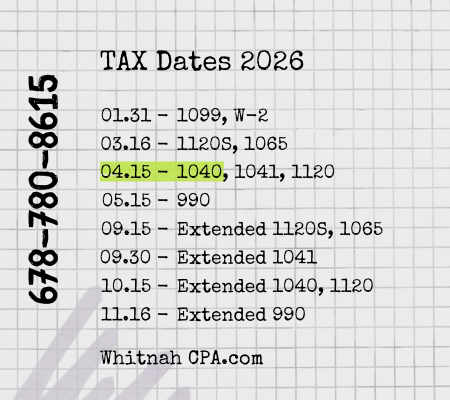What to Bring to Your Accountant to Prepare Your Tax Return.
- Iryna Whitnah
- Nov 5, 2018
- 3 min read
Updated: Jul 31, 2020
As we are approaching the end of the year, it is time to start thinking about taxes. We love helping our clients and making the tax filing process as easy as possible. The best way to make tax season smoother is to make sure you have all of the paperwork and information we need. As a rule of thumb, the more information you can provide, the better.
Here are the top things that are absolute “musts” you should bring with you to your tax appointment.
1. Prior year’s tax return
This is generally only needed if you are a new client. If so, bring your tax returns from the previous three years.
2. Personal and Dependent identification information
Bring social security numbers, ITINs, and dates of birth, driver’s license or state issued ID. To claim dependents on your tax return, you will need their Social Security numbers as well as their full names and dates of birth.
3. Wage and Earning Statements
If you earned income from last year, you need to bring in a record of the income. This includes:
Form W-2, W-2G, and 1099-R, from all employers and payers
Self-employed business income and expenses (Forms 1099-MISC and 1099K)
Interest and dividend statements
Social Security, State Income Tax refund and Unemployment Compensation forms
Information on Broker and Barter Exchange Transactions
Records of lottery or gambling winnings and losses
Record of rental income and expenses
Healthcare reimbursements
Jury duty records
Hobby income and expenses
Prizes and awards
Alimony received.
4. Expense Records
If you want to get your deductions and credits, it’s important that you have supporting documentation that proves your expenses. This includes receipts, invoices, medical bills, charitable contributions, IRA contributions, job-hunting expenses, mileage logs, education expenses, self-employment expenses, and more. It’s always better to bring too much documentation than too little. Collect records for the following types of expenses:
Mortgage Interest Statement – Form 1098 (including home equity loans); and records of the purchase or sale of your residence
Records of real estate and personal property taxes paid
Records of state or local taxes paid (including sales tax for large purchases such as autos, boats, building products)
Records of medical, eye care and dental expenses and mileage
Receipts for cash and non-cash charitable contributions
Mileage records and expenses incurred conducting volunteer work for charitable organizations
Tuition and Education Fees paid and Student Loan Interest paid Records of moving expenses paid and any casualty or theft losses
Total amount paid for a day care provider and the daycare provider’s tax identifying number – the provider’s Social Security Number or Employer Identification Number
Alimony payments
Records of any qualified energy efficient home improvements purchases
Records of federal and state estimated taxes and foreign taxes paid
Job hunting expenses
5. Health Insurance Documents
Bring health insurance documents:
Health Insurance Marketplace Statement (Form 1095-A).
Health Coverage Statements from your Insurer or Employer (Form 1095-B/1095-C).
6. IRA Information
Bring documents and confirmations for IRA transactions:
Amount contributed for 2017
Traditional IRA basis
Value of IRAs as of December 31 2017
7. Business Expense Receipts
Mileage, Meals and Lodging expenses, Travel expenses, Parking and tolls amounts, Office in home information
8. Bank Information
For those wanting direct deposit, please bring a voided check from your checking account or if using your savings account bring the account and routing numbers.
9. If Your Were Affected by a Disaster
There are deductions that are applicable if you were affected by a federally declared disaster.
Records of property loss
Records of building/repair costs
Insurance reimbursement/claims to be paid
FEMA assistance information
10. Business Use of Home Information
If you use a part of your home for your business, bring the following:
Square footage calculation of the area used for business
The date you began using the space for business
Original purchase price paid for the property
Summary of your utility expenses (gas, electric, oil, condo fees, landscaping, snowplowing, maintenance, etc)
Major home improvements and direct office expenses (repairs, business phone, etc).
Filing a tax return is one of the more complicated financial tasks you have to handle each year. And because of the complex codes, room for interpretation, and different rules for various situations, it can be a stressful and challenging process. Instead of attempting to file your own tax return and getting frustrated over the process, why not let an accountant handle everything for you? Just make sure you bring in the documentation mentioned above, as well as anything else you believe may be important.





Comments